Middle East
I was forced to burn my books to survive in Gaza | Israel-Palestine conflict

When we were children, my siblings and I regularly spent our pocket money on new books. Our mother had instilled in us a passionate love for books. Reading wasn’t just a hobby; it was a way of living.
I still remember the day our parents surprised us with a home library. It was a tall and wide piece of furniture with lots of shelves that they had placed in the living room. I was just five years old, but I recognised the sacredness of its corner from the very first moment.
My father was determined to fill the shelves with a variety of books—on philosophy, religion, politics, languages, science, literature, etc. He wanted to have a wealth of books that could compete with the local library.
My parents would often take us to the bookshop attached to the Samir Mansour Library, one of Gaza’s most iconic bookshops. We would be allowed to pick up to seven books each.
Our schools nurtured this love for reading as well, organising visits to book fairs, reading clubs, and discussion panels.
Our home library became our friend, our solace in both war and peace, and our lifeline on those dark, haunting nights lit only by bombs. Gathered around fire pits, we would discuss the works of Ghassan Kanafani and recite the poems of Mahmoud Darwish we had memorised from books in our library.
When the genocide started in October 2023, the blockade on Gaza was tightened to an unbearable level. Water, fuel, medicines, and nutritious food were cut off.
When gas ran out, people started burning whatever they could find: wood from the rubble of homes, tree branches, trash … and then books.
Among our relatives, this first happened to my brother’s family. My nephews, heavy-hearted, sacrificed their academic future: they burned their freshly printed schoolbooks—whose ink hadn’t even dried — so their family could prepare a meal. The very books that once fed their minds now fed the flames, all for survival.
I was appalled at the book burning, but my 11-year-old nephew Ahmed confronted me with the reality. “Either we starve to death, or we fall into illiteracy. I choose to live. Education will be resumed later,” he said. His answer shook me to the core.
When we ran out of gas, I insisted that we buy wood, even though its price was skyrocketing. My father tried to convince me: “Once the war is over, I will buy you all the books you want. But let us use these for now.” I still refused.
Those books had borne witness to our ups and downs, our tears and our laughter, our successes and our setbacks. How could we possibly burn them? I started rereading some of our books — once, twice, three times — memorising their covers, their titles, even the exact number of pages, burying in them my fear that our library might be the next sacrifice.
In January, after a temporary truce was concluded, cooking gas was finally allowed into Gaza. I breathed a sigh of relief, thinking that my books and I had survived this holocaust.
Then in early March, the genocide resumed. All humanitarian aid was blocked: no food, no medical supplies, and no fuel could enter. We ran out of gas in less than three weeks. The full blockade and the massive bombardment made it impossible to find any other source of fuel for cooking.
I had no choice but to concede. Standing before our library, I reached for the international human rights law volumes. I decided they had to go first. We were taught these legal norms at school, we were made to believe that our rights as Palestinians were guaranteed by them and that one day, they would lead to our liberation.
And yet, these international laws never protected us. We have been abandoned to genocide. Gaza has been teleported to another moral dimension — where there is no international law, no ethics, no value for human life.
I tore those pages into bits, recalling how countless families had been torn to pieces by bombs, just like that. I fed the torn pages to the flames, watching them turn to dust — an anguished offering in memory of those who had been burned alive: Shaban al-Louh, who burned alive when Al-Aqsa Hospital was attacked, journalist Ahmed Mansour, who burned alive when a press tent was attacked, and countless others whose names we will never know.
Next, we burned all the pharmacology books and summaries belonging to my brother, a pharmacology graduate. We cooked our canned food over the ashes of his years of hard work. Still, it was not enough. The siege grew more suffocating and the fires devoured shelf after shelf of books. My brother insisted on burning his favourite books before touching any of mine.
But there was no hiding from the inevitable. We were soon down to my books. I was forced to burn my treasured collections of Mahmoud Darwish’s poetry; the novels of Gibran Khalil Gibran; the poems of Samih al-Qasim, the voice of resistance; the novels of Abdelrahman Munif that I held dear; and the Harry Potter novels that I had spent my teenage reading. Then came my medical books and summaries.
While I stood there watching the flames consume them, my heart burned as well. We tried to make the sacrifice feel worthy — cooking a more scrumptious meal: pasta with bechamel sauce.
I thought that was the peak of my sacrifice, but my father went further. He dismantled the library’s shelves to burn as wood.
I managed to save 15 books. These are history books about the Palestinian cause, the stories of our ancestors, and the books belonging to my grandmother, who was ruthlessly killed during this genocide.
Existence is resistance; these books are my proof that my family has always existed here, in Palestine, that we have always been the owners of this land.
Genocide has pushed us to do things we never imagined in our darkest nightmares. It forced us to mutilate our memories and break the unbreakable, all for survival.
But if we survive — if we survive — we will rebuild. We will have a new home library and fill it again with the books we love.
The views expressed in this article are the author’s own and do not necessarily reflect Al Jazeera’s editorial stance.
Middle East
Israel releases Gaza paramedic who survived deadly attack on health workers | Gaza News
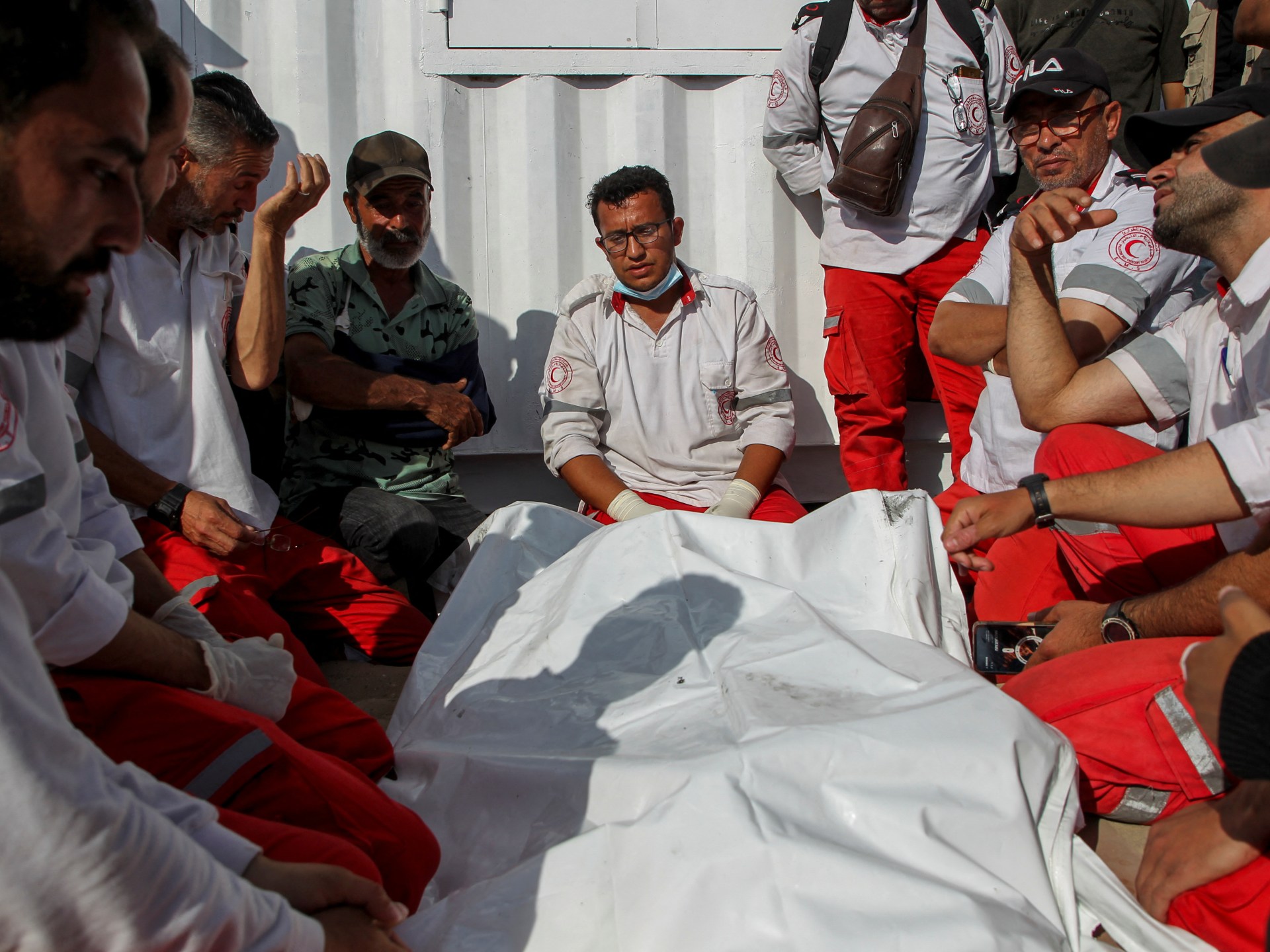
A Palestinian paramedic who survived a deadly Israeli attack on a group of first responders in southern Gaza last month has been released from Israeli detention, the Palestine Red Crescent Society (PRCS) says.
Assaad al-Nassasra, an ambulance driver, was among at least 10 Palestinian detainees who were released into the Gaza Strip on Tuesday, the PRCS said.
The agency shared footage on social media that showed a visibly emotional al-Nassasra, dressed in a bright red PRCS jacket, embracing his colleagues after 37 days in Israeli detention.
His exact whereabouts had been unknown after the Israeli military opened fire on Palestinian first responders in the Rafah area of southern Gaza on March 23, killing 15 health workers in an attack that drew widespread outrage and calls for an independent investigation.
“He had been arrested while performing his humanitarian duty during the massacre of medical teams in the Tel Al-Sultan area of Rafah Governorate,” the PRCS said.
The first moments of colleague Asaad Al-Nsasrah’s arrival and reunion with his teammates following his release today, after 37 days in detention by the occupation forces. He had been arrested while performing his humanitarian duty during the massacre of medical teams in the Tel… pic.twitter.com/TzGHbZHeJl
— PRCS (@PalestineRCS) April 29, 2025
The PRCS reported last month that Israeli forces opened fire on the medics, who were driving in ambulances to assist wounded Palestinians at the site of an earlier Israeli attack.
The agency said it lost contact with its team and Israeli forces blocked access to the site of the incident.
When United Nations and Palestinian officials were able to reach the area a week later, they found a mass grave where bulldozed ambulances and bodies were buried.
Eight PRCS workers were killed along with six Palestinian Civil Defence team members and one UN employee, the PRCS said.
“This massacre of our team is a tragedy not only for us at the Palestine Red Crescent Society, but also for humanitarian work and humanity,” the agency said in a statement on March 30.
A video recovered from the mobile phone of one of the slain medics showed their final moments. They were wearing highly reflective uniforms and were inside clearly identifiable rescue vehicles before they were shot by Israeli forces.
Amid the international outcry, the Israeli military announced it would investigate what happened.
It said last week that its probe had identified a series of “professional failures”. The army said its code of ethics was not violated and one soldier was dismissed.
The PRCS slammed the Israeli military’s findings and called for an independent and impartial investigation by a UN body.
One of two survivors
Al-Nassasra, 47, is one of two people who survived the attack.
The other survivor, Munther Abed, said at the time that he had seen al-Nassasra being captured, bound and taken away.
The father of six last spoke to his family on the night of the Israeli attack when he disappeared, telling them he was on his way to the PRCS headquarters to break his Ramadan fast with his colleagues, according to his son Mohamed.
When the family tried to call him about dawn the next day, he didn’t respond, and they found out from the PRCS that nobody could reach him or the other emergency workers.
Al-Nassasra had always warned his family that whenever he headed out on a mission, he may not make it back, his son said. But the family tried not to think about that as al-Nassasra continued his work throughout Israel’s 18-month war on Gaza.
His colleague Ibrahim Abu al-Kass also told Al Jazeera that al-Nassasra always carried sweets to offer children to encourage them to play somewhere safe, not in the middle of the road.
Israel has carried out an intensified campaign of arrests during the war. According to the Palestinian prisoner support network Addameer, at least 9,900 Palestinians are currently being held in Israeli detention facilities, including 400 children.
More than 3,400 are held without charge or trial under what’s known as “administrative detention”, which can be renewed for six-month periods indefinitely.
Al-Nassasra was released into Gaza through the Kissufim checkpoint along with the 10 other detainees before they were sent to a hospital in central Gaza’s Deir el-Balah for medical checkups.
Reporting from the city, Al Jazeera’s Tareq Abu Azzoum said the released detainees reported being tortured in “horrific ways” and were in a bad physical and psychological state.
Israeli forces have routinely targeted first responders, humanitarian workers and journalists during the Gaza bombardment.
More than 52,300 Palestinians have been killed since the war began on October 7, 2023, while at least 117,905 have been wounded, according to Gaza’s Ministry of Health.
Middle East
Jordan ‘forcibly evicted’ Palestinians from informal refugee camp: HRW | Al-Nakba News
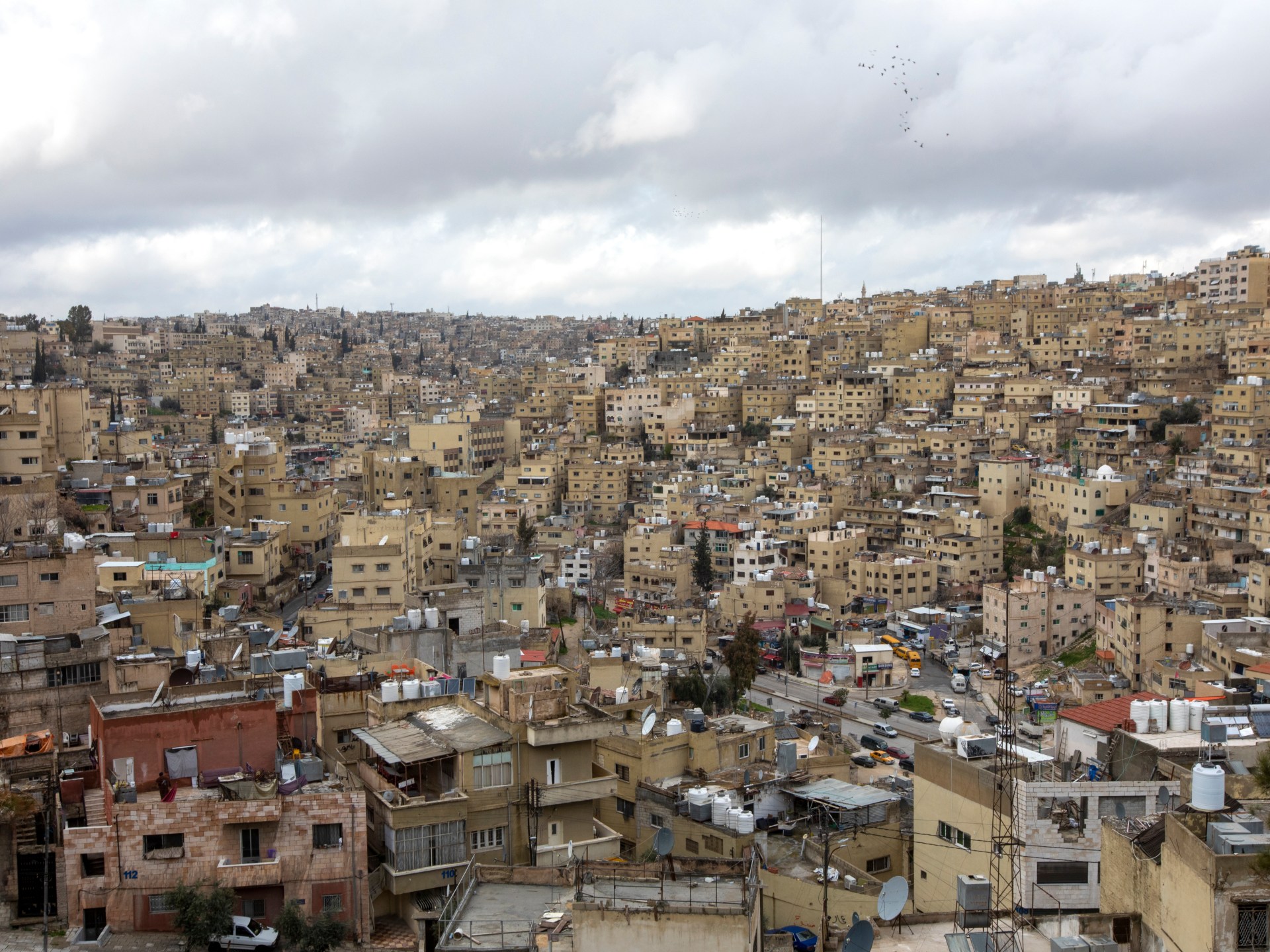
Dozens of residents displaced from Amman’s al-Mahatta camp as authorities seek to widen roads, reduce congestion.
Jordanian authorities have “forcibly evicted” about 100 people from an informal refugee camp hosting displaced Palestinians, according to an NGO.
Human Rights Watch (HRW) reported on Tuesday that the Greater Amman Municipality (GAM) demolished 25 homes housing at least 101 people, as well as shops, in the capital’s al-Mahatta camp in November and December last year.
The humanitarian organisation said the evicted people were not given adequate consultation, notice, compensation, or relocation assistance as the authorities cleared the way for a town planning project.
‘Encroached upon’
“Displacing families and disrupting their livelihoods without adequate safeguards and fair compensation leaves dozens of people with few places to seek help,” said Adam Coogle, HRW’s deputy Middle East director.
The al-Mahatta camp, which is said to house approximately 8,000 people from Palestinian families displaced by the 1948 Nakba, is not recognised as a refugee camp by the Jordanian government.
The city’s authorities said in December that GAM’s four-year “Strategic Plan” for the city running to 2026 includes traffic improvements, increasing green space, and reducing population density in informal settlements.
The demolition operations also aim to reclaim lands owned by the Amman Municipality that have been “encroached upon” and on which buildings have been erected, the city said, according to the Alghad outlet.
Donation
Dozens of residents now displaced claim to have been left in the lurch, saying they were given only “two weeks to a month’s notice” to leave their homes and “vague verbal promises of compensation of 80 Jordanian dinars [$113] per square metre, with limited transparency regarding the process or timeline”, HRW reports.
The NGO quoted Amman Mayor Yousef al-Shawarbeh as saying that the displaced Palestinians were not entitled to compensation as they were “encroaching on state property”, explaining that they had been instead offered a “donation”.
The demolition of homes and shops at al-Mahatta was conducted despite an official pledge from former Prime Minister Omar Razzaz in 2019 to safeguard residents’ homes after a previous attempt to evict them in 2017.
Middle East
Israel carrying out ‘live-streamed genocide’ in Gaza, Amnesty says | Israel-Palestine conflict News
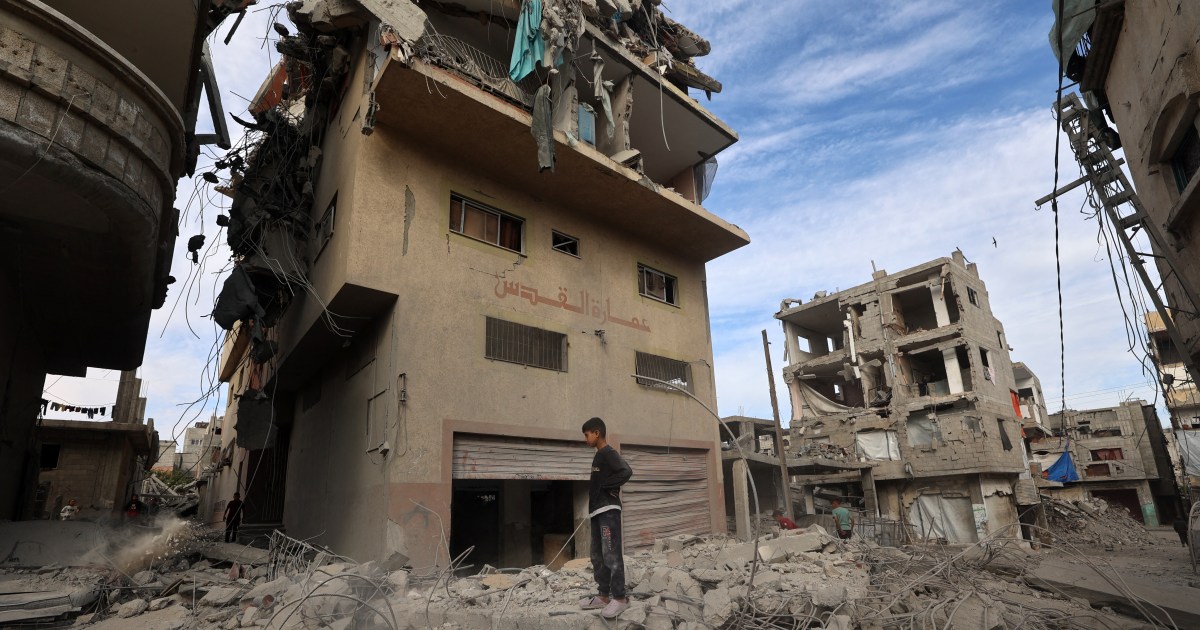
Amnesty also says US President Donald Trump is responsible for ‘multiplicity of assaults’ on human rights.
Israel is perpetrating a “live-streamed genocide” in Gaza, committing illegal acts with the “specific intent” of wiping out Palestinians, Amnesty International has said.
Israeli forces in Gaza have violated the United Nations Genocide Convention with acts that include “causing serious bodily or mental harm to civilians” and “deliberately inflicting conditions of life calculated to bring about their physical destruction”, the human rights organisation said in its annual report released on Monday.
Israel has repeatedly “denied, obstructed and failed to allow and facilitate” humanitarian access to Gaza, and invaded the southern city of Rafah, despite warnings by the international community and the International Court of Justice about the “devastating effect it would have on the civilian population”, Amnesty said.
Israeli air strikes have also frequently hit civilians who were following evacuation orders, while its forces continued to “arbitrarily detain and, in some cases, forcibly disappear Palestinians”, the rights group said.
“Since 7 October 2023 – when Hamas perpetrated horrific crimes against Israeli citizens and others and captured more than 250 hostages – the world has been made audience to a live-streamed genocide,” Amnesty’s secretary-general, Agnes Callamard, said in the introduction to the report.
“States watched on as if powerless, as Israel killed thousands upon thousands of Palestinians, wiping out entire multigenerational families, destroying homes, livelihoods, hospitals and schools.”
Israel and “its powerful allies, first among them the USA, claimed that or acted as if international law did not apply to them”, Callamard said.
Israel has strongly denied committing genocide, insisting that it is acting in self-defence against Hamas and that it takes extraordinary measures to protect civilians.
More than 51,300 people, including at least 17,400 children, have been killed by Israeli forces in Gaza since October 7, 2023, according to Palestinian health authorities.
About 1,200 people were killed in Hamas’s October 7 attacks on Israel, according to Israeli authorities.
In its report, Amnesty also raised alarm about “unprecedented forces”, including the administration of United States President Donald Trump, that it said posed a threat to human rights globally.
“A multiplicity of assaults – against human rights accountability, against international law, and against the UN – have been but some of the hallmarks of the first 100 days of US President Donald Trump’s ‘reign’ in 2025,” Callamard said.
“But those reckless and punishing offensives, against efforts to end global poverty and undo long standing racial and gender-based discrimination and violence, did not start this year. Red lines don’t turn green overnight.”
Amnesty also expressed concern about alleged human rights violations committed by Russia in its invasion of Ukraine and attacks on gender equality in Afghanistan and Iran.
“The Taliban government criminalized the public existence of women and girls, passing so-called vice and virtue laws, denying their rights to work and education. Dozens of women protesters were forcibly disappeared or arbitrarily detained,” Callamard said.
“In Iran, new compulsory veiling laws intensified oppression of women and girls, imposing flogging, exorbitant fines and harsh prison sentences, while officials and vigilantes who violently attack women and girls for defying the law continued with impunity.”
-

 Lifestyle2 days ago
Lifestyle2 days agoHow bugs and beet juice could play roles in the race to replace artificial dyes in food
-

 Middle East1 day ago
Middle East1 day agoDeadly US strike hits Yemeni migrant centre | Israel-Palestine conflict News
-
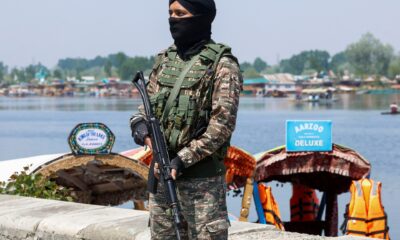
 Conflict Zones2 days ago
Conflict Zones2 days ago‘Burst balloon’: How Pahalgam attack shattered Modi’s Kashmir narrative | Narendra Modi News
-
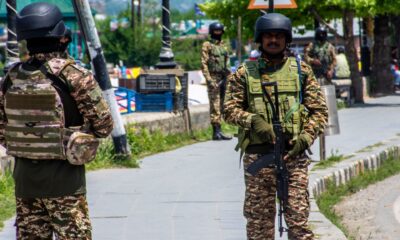
 Conflict Zones2 days ago
Conflict Zones2 days agoIndia and Pakistan continue to trade fire across Kashmir border | Conflict News
-
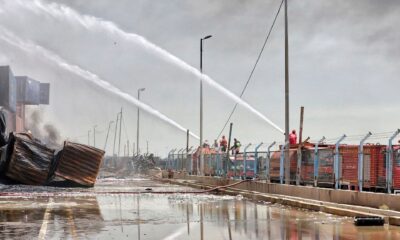
 Middle East1 day ago
Middle East1 day agoFires continue to rage at key Iran port as explosion death toll rises to 46 | Oil and Gas News
-
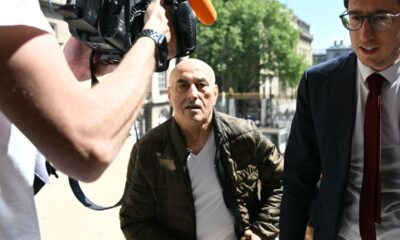
 Europe1 day ago
Europe1 day agoKim Kardashian armed robbery trial opens in Paris
-

 Sports1 day ago
Sports1 day agoMao Saigo: Japanese golfer celebrates Chevron Championship win by jumping in a pond
-
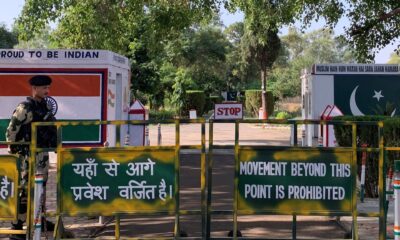
 Conflict Zones1 day ago
Conflict Zones1 day agoKashmir attack: Why Pakistan’s threat to suspend Simla Agreement matters | Conflict News




